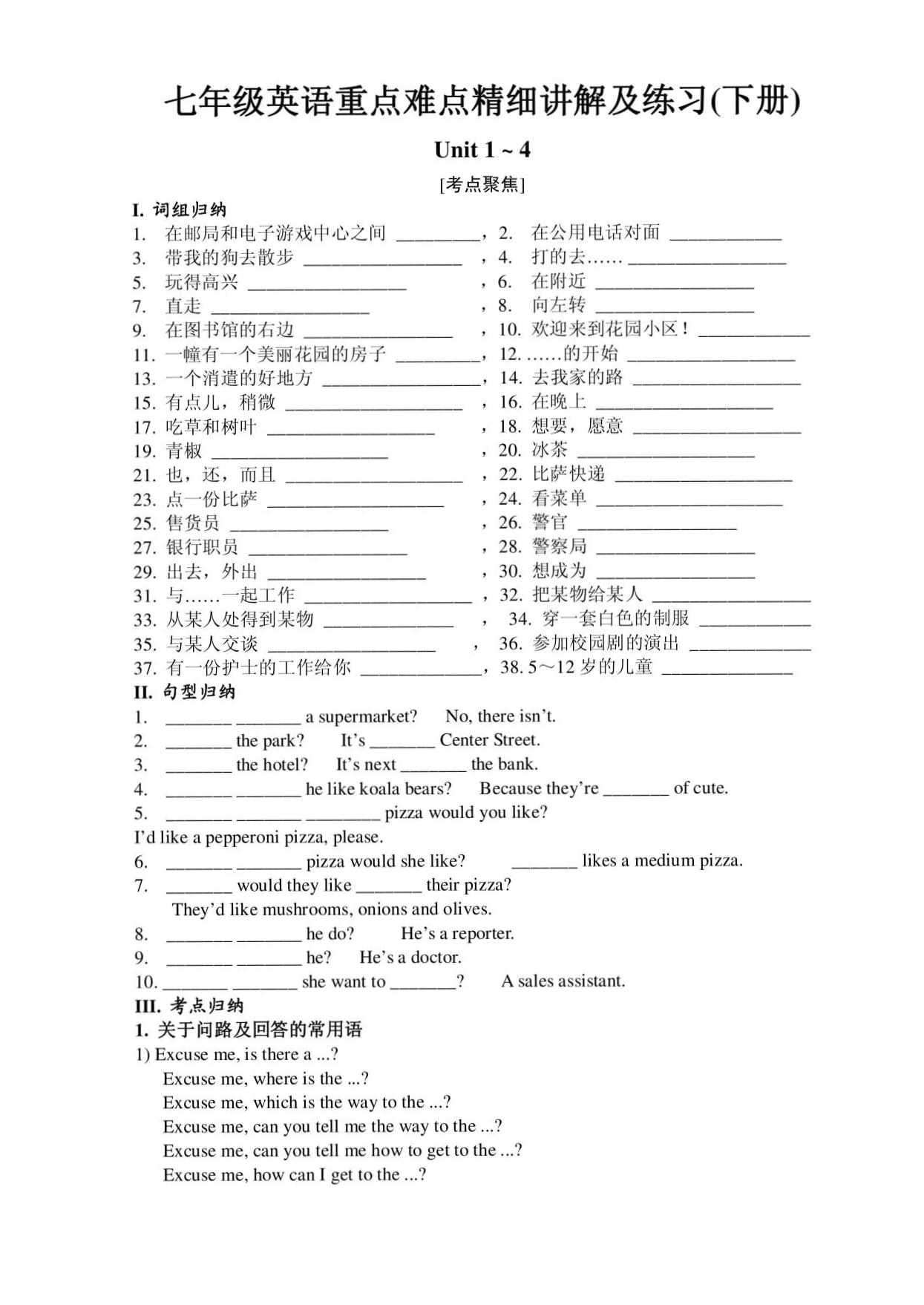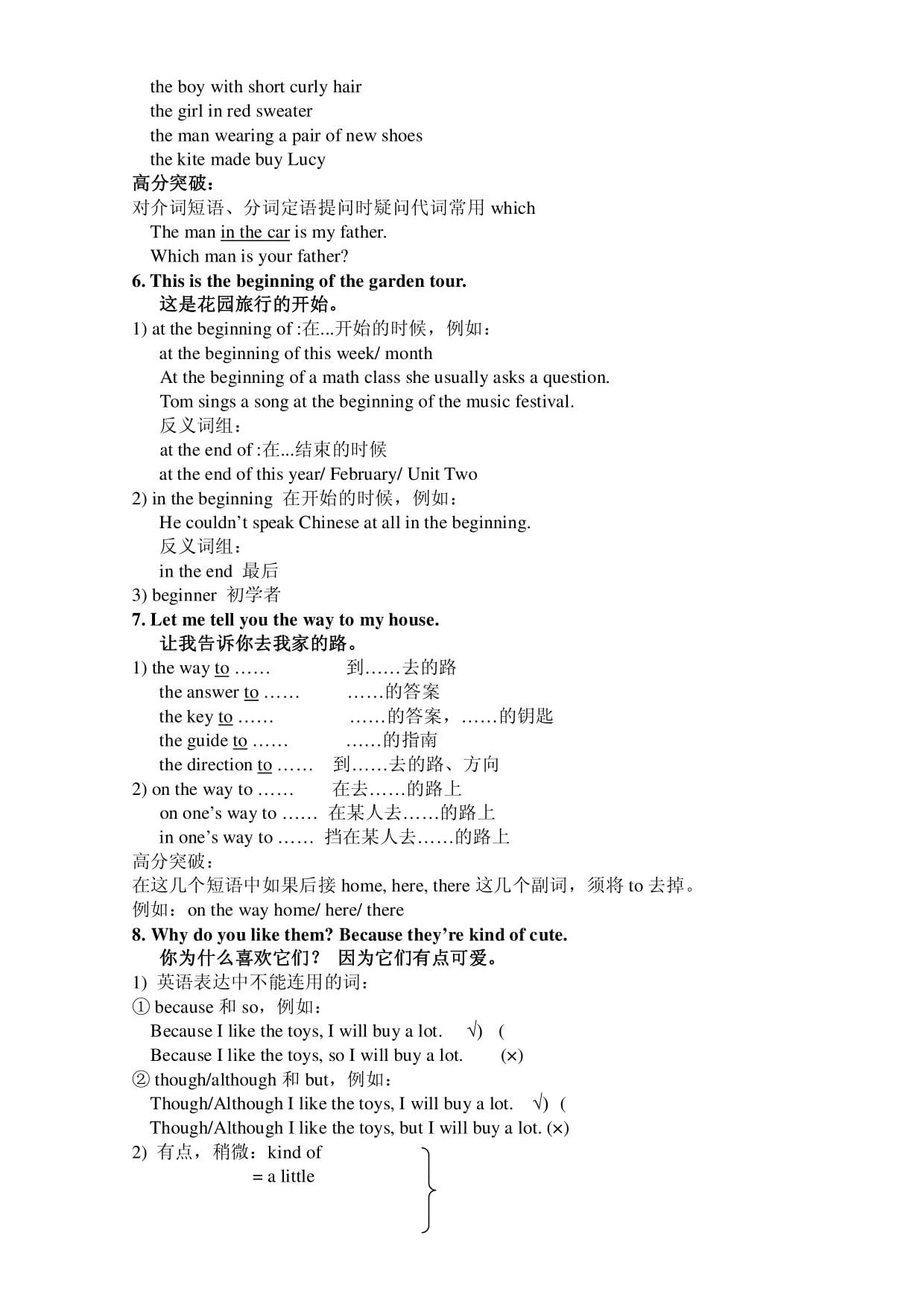




版权说明:本文档由用户提供并上传,收益归属内容提供方,若内容存在侵权,请进行举报或认领
文档简介
七年级英语重点难点精细讲解及练习(下册)
Unit1~4
[考点聚焦]
I.词组归纳
1.在邮局和电子游戏中心之间,2.在公用电话对面_____________
3.带我的狗去散步,4.打的去……
5.玩得高兴________________,6.在附近__________________
7.直走__________________,8.向左转__________________
9.在图书馆的右边,10.欢迎来到花园小区!___________
11.一幢有一个美丽花园的房子,12.的开始___________________
13.一个消遣的好地方_______14.去我家的路___________________
15.有点儿,稍微____________,16.在晚上____________________
意
想要愿
17.吃草和树叶______________,18.,
冰
茶
19.青椒____________________,20.递
比
萨
快
一
21.也,还,而且____________,22.一
单
看
菜
23•点一份比萨______________,24.
警
官
售货员__________________,26.
警
25.察
局
一
银行职员________________想
27.,28.成
为
一
把
出去,外出______________,30.某
29.物
某
给
31.与...一起工作__________,32.
33.从某人处得到某物,34.穿一套白色的制服
35.与某人交谈______________36.参加校园剧的演出.
37.有一份护士的工作给你——38.5〜12岁的儿童―
II.句型归纳
1.asupermarket?No,thereisn't.
2.thepark?It'sCenterStreet.
3.thehotel?It'snextthebank.
4.helikekoalabears?Becausethey'reofcute.
5.pizzawouldyoulike?
rdlikeapepperonipizza,please.
6.pizzawouldshelike?likesamediumpizza.
7.wouldtheyliketheirpizza?
They9dlikemushrooms,onionsandolives.
8.hedo?He'sareporter.
9.he?He'sadoctor.
10.shewantto?Asalesassistant.
III.考点归纳
1.关于问路及回答的常用语
1)Excuseme,istherea...?
Excuseme,whereisthe...?
Excuseme,whichisthewaytothe...?
Excuseme,canyoutellmethewaytothe...?
Excuseme,canyoutellmehowtogettothe...?
Excuseme,howcanIgettothe...?
2)Go/Walkstraight(alongthestreet).
Go/Walkalong/up/downthestreet.
Go/Walkalong/up/downthestreettotheend.
Go/Walkalong/up/downthestreetabouttenminutes.
Turn(tothe)left/right.
Turnleft/rightatthetrafficlights.
Turnleft/rightatthesecondturning.
(=Takethesecondturningontheleft/right.)
2.There'sabankontheCentralStreet.在中心路有一个银行。
在路上:in/onthestreet
高分突破:
以上两个短语可互换,当出现具体的门牌号时介词用at,例如:
atCentralStreetNo.17在中心路17号
3.T\irnleftoffthebusyFirstAvenueandenjoythecity'squietstreetsandsmallparks.
向左转出第一大道,你可以欣赏到城市里宁静的街道和小公园。
enjoyv.喜欢,欣赏
1)enjoysth.
Doyouenjoythedinnertonight?
2)enjoy+doingsth.喜欢做某事
Jackenjoysplayingthedrum.
3)enjoyoneself玩得高兴
=haveagoodtime
=havefun
Theyenjoyedthemselvesinthezooyesterday.
=Theyhadagoodtimeinthezooyesterday.
=Theyhadfuninthezooyesterday.
4.TakeawalkthroughtheparkonCentralAvenue.
步行穿过中心大道的公园。
1)散步:takeawalkhaveawalkgoforawalkwalk
2)through穿过(立体的)..
across穿过(平面的)...
例如:go/walk/run/drivethroughtherain/forest/city
go/walk/run/driveacrossthestreet/road/bridge/avenue
swimacrosstheriver
高分突破:
Gothroughthestreet.顺着这条街走。
Goacrossthestreet.(横穿)过马路。
5.Nexttothehotelisasmallhousewithaninterestinggarden.
在宾馆旁边是一幢有一个有趣花园的小房子。
1)形容词作定语修饰名词放在名词的前面,例如:
anewteacherafantasticmovieanexcitingsoccerballgame
2)形容词修饰不定代词放在不定代词的后面,例如:
somethingdangerousanythingdifferent
3)介词短语、分词作定语放在所修饰词的后面,例如:
aT-shirtlikethis
astudentinNo.14MiddleSchool
theboywithshortcurlyhair
thegirlinredsweater
themanwearingapairofnewshoes
thekitemadebuyLucy
高分突破:
对介词短语、分词定语提问时疑问代词常用which
Themaninthecarismyfather.
Whichmanisyourfather?
6.Thisisthebeginningofthegardentour.
这是花园旅行的开始。
1)atthebeginningof:在…开始的时候,例如:
atthebeginningofthisweek/month
Atthebeginningofamathclasssheusuallyasksaquestion.
Tomsingsasongatthebeginningofthemusicfestival.
反义词组:
attheendof:在…结束的时候
attheendofthisyear/February/UnitTwo
2)inthebeginning在开始的时候,例如:
Hecouldn'tspeakChineseatallinthebeginning.
反义词组:
intheend最后
3)beginner初学者
7.Letmetellyouthewaytomyhouse.
让我告诉你去我家的说。
1)thewayto....到...去的路
theanswerto..............的答案
thekeyto..............的答案,....的钥匙
theguideto..............的指南
thedirectionto.......到...去的路、方向
2)onthewayto.....在去...的路上
onone'swayto.......在某人去...的路上
inone'swayto.......挡在某人去...的路上
高分突破:
在这几个短语中如果后接home,here,there这几个副词,须将to去掉。
例如:onthewayhome/here/there
8.Whydoyoulikethem?Becausethey'rekindofcute.
你为什么喜欢它们?因为它们有仁可爱。
1)英语表达中不能连用的词:
①because和so,例如:
BecauseIlikethetoys,Iwillbuyalot.Y)(
BecauseIlikethetoys,soIwillbuyalot.(x)
②though/although和but,例如:
Though/AlthoughIlikethetoys,Iwillbuyalot.4)(
Though/AlthoughIlikethetoys,butIwillbuyalot.(x)
2)有点,稍微:kindof、
=alittle
=alittlebit+adj.
=abit
高分突破:
l)kindof在某些短语中表示种类,例如:
allkindsof各种各样的differentkindsof各种各样的,不同种类的
manykindsof许多种的this/thatkindof这/那种的
akindof一种...
2)alittle+不可数名词“一点…”,前面常与only连用。
little+不可数名词“几乎没有…”,前面常very与连用°
注意两个翻译:
Thereisalittlesheep.有一只小绵羊。
Thereisalittlewater.有一点水。
3)notabit=notatall
notalittle=verymuch
9.Isn'thecute?难道他不可爱吗?
难道它不在你的包里吗?是的,它不在。
否定疑问句的构成:用not的简略式与句首的be,have,has,助动词或情态动词连用,
开始一个问句。
否定疑问句用来表达一种强烈的肯定或惊奇、赞扬、责备、建议等,回答是根据实际情
况或事实用yes和no。例如:
Isn'titaninterestingTVshow?Yes,itis./No,itisn't.
Can'tyoudoitbyyourself?Yes,Ican./No,Icant
高分突破:
1)回答时应与事实一致,而不应按汉语的习惯来做答。
2)回答时注意一致性,即Yes+肯定,No+否定。以下的回答是错误的:
Aren'ttheyours?Yes,theyaren't./No,theyare.
10.Whatotheranimalsdoyoulike?你还喜欢别的什么动物?
1)other,others
otheradj.
other+可数名词的复数/不可数名词“其他的……,另外的……”,不单独使用。
彳列女口:Ineedotherdictionaries.
others,pron.
others=other+可数名词复数
例如:Idon'tliketheseshorts,pleasegivemesomeothers(=othershorts).
2)other,another
otheradj.
other+可数名词的复数/不可数名词“其他的……,另外的……”(三者以上),不单独使
用。
anotheradj.
another+可数名词单、复数“另一个(一些).・・…”(三者以上),可单独使用(此时为
代词)。
例如:Doyouwantanothercupofcoffee?
Weneedanotherthreechairs(=threemorechairs)
3)theother,theothers
one...theother(theother+可数名词单数)一个....另一个
some...theothers(theother+可数名词复数)一些...另一些
XX.Whatwouldyoulike?你想要什么?
1)wouldlikesth.想要什么wouldliketodosth.想做什么
wouldlikesb.todosth.想某人做某事
2)同义句互换:
Whatkindoffoodwouldyoulike?=Whatwouldyouliketoeat?
3)请你……。(注意两个交际英语的区别)
Wouldyouliketodosth.please?
Wouldyoupleasedosth.?
例如:请你把书放进抽屉里。
Wouldyouliketoputthesebooksinthedrawer,please?
Wouldyoupleaseputthesebooksinthedrawer?
12.Whafsyouraddress?你的地址是哪里?
=Wheredoyoulive/work...?
高分突破:.
对address提问疑问代词用what,不能用where。
Whereisyoure-mailaddress?(x)
13.Wealsohavegreatsaladaswellassoda.
我们还有配有苏打水的沙拉。
=Wealsohavegreatsaladwithsoda.
高分突破:
with和aswellas连接主语时,谓语动词的单复数由with和aswellas前面的主语决定;
但是and连接主语时谓语动词用复数,例如:
TonyaswellasBillgoestomovieseveryweek.
=TonywithBillgoestomovieseveryweek.
=TonyandBillgotomovieseveryweek.
14.英语中对职业的提问:
Whatdoeshedo?=Whatishe?=What'shisjob?
高分突破:
what是对人的职业提问,而who是对人的身份提问,因此在回答时要注意区别:
Who'sthatman?He'smyuncle.
What'syouruncle?He'sapoliceman.
15.Peoplegivemetheirmoneyorgettheirmoneyfromme.
人们给我钱或是从我这星拿走他们自己的钱。
givesth.tosb.=givesb.Sth.
类适用法的词还有:
lend,show,pass,send,bring,sell,offer,hand,teach,tell,return,throw,wish等。
高分突破:
当sth.为代词it或them时,只能用:giveit/themtosb.的结构。
16.1wearawhiteuniform.我穿一套白色的制服。
wear,puton,dress,bein
l)wear“穿着",表状态=bein
Shewearsapurplesweatertoday.
=She'swearingapurplesweatertoday.
=She'sinapurplesweatertoday.
wear“留,蓄”
wearabeard留胡子wearlonghair蓄长发wearsunglasses戴太阳眼镜
2)puton“穿上”,表动作
Tomisputtingonhisshirt.
3)dress"穿Z可表动作或状态
dresssb.=getsb.dressed给某人穿衣服
Heistooyoungtodresshimself.=Heistooyoungtogethimselfdressed.
17.1meetinterestingpeopleeveryday.
我每天遇见有趣的人。
1)meet“遇见,认识,迎接“例如:
Ilikemeetingdifferentpeopleeveryday.
Nicetomeetyou.
Wouldyoupleasemeetherattheairport?
2)everyday副词词组,表示“每天,天天”,在句中作状语。
everyday形容词,表示“日常的,每日的“,在句中作定语。
Somepeopleareveryinterestedinthestars'everydaylife.
有些人对明星的日常生活非常感兴趣。
Peterpracticeshistrumpeteveryday.Peter每天都练习吹喇叭。
18.Doyouwanttoworkforusasareporter?
你原意为我们工作吗?是当记者?
1)workfor为..工作Jeffworksfbrabigcompany.
2)workas当..Wouldyouliketoworkasawaiter?
3)workat/in在哪里工作Hisbrotherworksinafamoushotel.
IV.语法精讲
一般现在时
1.构成
一般现在时主要由动词的原形表示,当主语是第三人称单数时,则在动词原形后加・s或
词尾读音分别为/s/,/z/和/iz/。规则如下:
规则例词
一般动词在词尾加-Shelp-helps
在清辅音后读/S/work-works
在元音和浊辅音后读climb-climbs
在以字母s,x,o,ch,sh结尾的动词后加teach-teaches
-es;guess-guesses
如词尾已有e,则只加-s,读作/iz/close-closes
以辅音字母+y结尾的动词,变y为istudy-studies
后,加-es,读作/〃fly-flies
高分突破:
动词have和be的第三人称单数形式为:has和is。
2.一般现在时的肯定、否定、一般疑问句式及回答。列表如下:
行为动词(以do为例)
目定式否定式一般疑问句式及回答
DoIdo...?
Yes,youdo.
No,youdon't.
II、Dowedo...?
WeWeYes,you(we)do.
Youdo...Youdon'tdo...No,you(we)don't.
TheyTheyDyoudo...?
Yes,I(we)do.
No,I(we)don't.
Dotheydo...?
Yes,theydo.
No,theydon't.
He]He]Doeshe(she,it)do...?
She[
Sheadoes...doesn'tdo...Yes,he(she,it)does.
ItJ
ItJNo,he(she,it)doesn't.
(don't=donot;doesn't=doesnot)
动词be
肯定式否定式一般疑问句式及回答
Iam...Iamnot...AmI...?
Yes,youare.
No,youaren't.
He]He]「he
She>is...She>isn't...IsYshe...?
ItJLit
It,
Yes,he(she,it)is.
No,he(she,it)isn't.
Arewe...?
Yes,youare.
We、We、No,youaren't
YouYouAreyou...?
They[are...They'aren't...Yes,weare.
No,wearen't.
J
Arethey...?
Yes,theyare.
No,theyaren't.
(isn't=isnot;aren't=arenot)
3.一般现在时的用法
1)表示经常发生的动作、存在的状态或现阶段的习惯。常用时间状语:often,always,
usually,everyday,onSundaysetc.
例如:Heoftengoestoworkonfoot.
2)表示客观事实和普遍真理。
例如:Threeandfourisseven.
Theearthtravelsaroundthesun.
3)表示现在的状态和外部特征。
例如:Youlookfantastictoday.
4)表现在的喜好、愿望、观点等。
例如:Hehopestoseeyousoon.
5)表示已安排或计划好将来必定会发生的动作或状态,即用一般现在时表示将来,一
般用动词:be,come,go,arrive,leave,startetc.
例如:Histrainleavesat2:00thisafternoon.
6)有几个由here,there开头的句子,动词用一般现在时表示现在正在发生的动作。
例如:Theregoesthebell.铃声响了。
Herecomesthebus.车来了。
高分突破:
在含时间和条件状语从句的复合句中,主语用一般将来时,从句则用一般现在时表示将
来的动作。
例如:Iwillstayathomeifitrainstomorrow.
She'llcometomyhomeassoonasshearriveshere.
[强化训练]
I.单项选择
1.InEnglandtrafficgoestheroad.
A.inthemiddleofB.ontherightofC.ontheleftofD.inthefrontof
2.TheGreensliveinthebighouseaninterestingswimmingpool.
A.inB.hasC.withD.on
3.Excuseme,canyoutellme?
A.howcanIgettothechildren'spalaceB.howtoarrivethechildren'spalace
C.howcangettothechildren'spalaceD.howtogettothechildren'spalace
4.Whichanimalisdangerous?
A.Ahorse.B.Alion.C.Agiraffe.D.Akoala.
5.Whatdoyouwanttoseeinthezoo?
A.otheranimalB.theotheranimalC.anotheranimalsD.otheranimals
6.________________He'dlikeamediumone.
A.Whatkindofpizzawouldhelike?B.Whatsizepizzawouldhelike?
C.Whatwouldhelikeonthepizza?D.Whatwouldheliketoeat?
7.rdliketodrink.
A.someorangesB.someicedteaC.somelemonadesD.juices
8.Heresomenewsaboutthejobforyou.
A.areB.isC.beC.am
9.1workhimawaiter.
A.as,toB.for,toC.for,asD,as,in
10.Thebusystreetistosmallchildren.
A.difficultB.dangerousC.interestingD.fun
II.句型转换:
1.Turnrightatthefirstturning.(变为否定句)rightatthefirstturning.
2.ThislioncomesfromAfrica.(用America改为选择疑问句)
thislionfrom?
3.Isn'tthepandacute?(给出否定回答).
4.Hewouldlikeapizzaandacupofcoffee.(变为否句)
Heapizzaandacupofcoffee.
5.Tmverybusywhenpeoplegoouttodinners.(变为一般疑问句)
verybusypeoplegoouttodinners?
6.1alwaysgivetheirmoneytothem.(对划线部分提问)
youalwaystothem?
7.Heusuallysleepsandrelaxes20hourseveryday.(对戈ij线部分提问)
heusuallyandeveryday?
8.1liketohelpthedoctors.(对戈ll线部分提问)youlike?
9.What,syourmother?(同义句转换)yourmother?
10.1thinkcheesepizzaisexpensive.(同义句转换)
Icheesepizzais.
III.用所给单词的适当形式填空:
1.1knowyousoon.(arrive)
2.Pandalikestoeatleavesand.(grass)
3.Teachersaskusinclass,(nottalk)
4.Theyworkinthepolicestation,theyare.(policeman)
5.Todaywehavesomegreat.(special)
IV.改错
1.1reallyliketomeetinterestingpeopleeveryday.
2.Hewouldlikessomepepperoniandolivesonthepizza.
3.Whatwouldyoulike?Welikestorybooks.
4.Becarefulwhenyougothroughthestreet.
5.Atthebeginingofthegardentourwe'llvisitHuaXinRd.
V.翻译填空
1.大桥街是一个好玩的地方。BridgeStreetisagoodplace,
2.每个人都想放松自己。Everyonethemselves.
3.我每天工作很晚。Ieveryday.
4.我想要一份小的橄榄比萨。Iwouldlikea.
5.Nancy坐在Paul的左边。Nancy.
VI.用所给句子补全对话
A:CanIhelpyou?
B:—.
A:Whatkindofnoodleswouldyoulike?
B:―.
A:Wehavebeef,chicken,mutton,cabbage,potato...
B:—.
A:Sure.Andwhatsizewouldyoulike?
B:__.
A:Wehavelarge,mediumandsmallbowls.
B:―.
1.OK,Tdlikemuttonandpotatonoodles,please.
2.Whatkindofnoodlesdoyouhave?
3.Oh,amediumbowl,please.
4.I'dlikesomenoodles,please.
5.Whatsizedoyouhave?
Unit5~8
[考点聚焦]
L词组归纳
1.............怎么样?___________________,2.举行晚会___________________
3.读书___________________,4.去购物____________________
5.访谈节目_____________________,6.在星期六的早上________________
7.打扫卧室___________________,8.在海滩_______________________
9.呆在家____________________,10.练习说英语________________________
11.为地理考试学习_____________,12.对大多数的孩子而言________________
13.拜访朋友_____________________,14.在......的前面__________________
15...等等____________________,16.爵士乐CD_____________________
17.舞曲____________________,18.上楼____________________
19.古典乐的乐迷_____________________,20.文化宫____________________
21.看起来像____________________,22.一头长长的直发________________
23.黑的短卷发一__________________,24.中等体格____________________
25.篮球队的队长____________________,26.受某人的欢迎___________________
27.讲笑话__________________,28.停止正在做的事_________________
29.下棋__________________,30.一副新面貌__________________
31.戴眼镜_______________,32.一位戴副滑稽眼镜的摇滚歌手—
33.留胡子__________________,34.一个短发男孩________________________
35.对……不友好一____________,36.一个在中国的交换学生_______
37.住在洛杉矶一________________,38.在黑板上__________________
II.句型归纳
1._______________you______overtheweekend?Wewenttothemovie.
2._______________,she______overtheweekend?Sheplayedthepiano.
3.________________yourweekend?Itwasgreat.
4.Where9sthepopmusic?_______upstairsand________right.
5.________________thecountryCDs?BehindtheclassicalCDs.
6.Bob'sfavorite_______________music?
Hisfavoritekindofmusicisjazz.
7.doyou?Fmshortandthin.
8.shelike?She'stallwithcurlyhair.
9.that?That'sMike,Peter'sbrother.
10.he?He'sserious.
III.考点归纳
1.Whataboutyourfriend?你朋友呢?
1)Whatabout+n./doingsth.?=Howabout+n./doingsth.?
2)What/Howaboutdoingsth.?
=Whynotdosth.?=Let'sdosth.?
这三个句型为同义句,表示提出建议。
2.Howdidthekidsspendtheweekend?孩子们是怎么过周末的?
1)花时间、金钱在某事上
spendtime/moneyonsth.
花时间、金钱做某事
spendtime/money(in)doingsth.
2)spendtimeonsth./(in)doingsth.=Ittakessb.+time+todosth.
例如:
Jimspentnearly2hourscleaninghisbedroom.
=IttookJimnearly2hourstocleanhisbedroom.
spendmoneyonsth./(in)doingsth.=pay...for...
Shespent$15onhernewshirt.
=Shepaid$15forhernewshirt.
3)spend,cost,pay,
spend的主语是人,spendtime/moneyonsth./(in)doingsth.
cost的主语是物,sth.costsb.+money
pay的主语是人,pan+money+forsth.
i列如:
Theyspent$80buyingthisinterestingradio.
Thisinterestingradiocostthem$80.
Theypaid$80forthisinterestingradio.
3.HesatonthebenchandwatchedWangWangplaywithafriendlyblackcat.
他坐在板凳上看着汪汪和一只友好的黑猫一起玩。
watch/see/lookat/hear/listentosb.doingsth.
看见/听见某人正在做某事
watch/see/lookat/hear/listentosb.dosth.
看见/听见某人做了某事
IheardtheboyEnglishat8:00yesterdaymorning,(practice)
IoftenheartheboyEnglishinthemorning,(practice)
答案:
1.practicing2.practice
4.Thenitwastimetogohome.接着是回家的时间了。
=Thenitwastimeforhome.
1)It'stime(forsb.)todosth.
=It'stime(forsb.)fordoingsth.=It'stimefor(one's)sth.
例如:
It'stimeformetohavebreakfast.=It'stimeformybreakfast.
2)Ihavenotimetohavebreakfast.
=Ihavenotimeforhavingbreakfast.
=Ihavenotimeforbreakfast.
=Thereisnotimeformetohavebreakfast.
=Thereisnotimeformybreakfast.
(Ihavenotime...=Idon'thaveanytime...)
(Thereisnotime...=Thereisn'tanytime...)
5.Hehasnodogandnofamily.他没有狗也没有亲人了。
=Hedoesn'thavedogsorfamilies.
noA,BorC=noA,noBandnoC没有A,B和C
例如:NowIhavenoarms,nohands,nolegsandnofeet.
=NowIhavenoarms,hands,legsorfeet.
6.音乐的类型:
countrymusic乡村乐dancemusic舞曲popmusic流行乐classicalmusic古典乐
jazzmusic爵士乐rockmusic摇滚乐folkmusic民乐lightmusic轻音乐
heavymetal重金属摇滚乐
高分突破:
music“音乐”不可数名词
一支乐曲:apieceofmusic
7.Whatdoeshelooklike?他长什么样?
=Whatishelike?
looklike=belike像
使用时注意动词的变化,例如:
Shelookslikehermother.=Sheislikehermother.
Shedoesn'tlooklikehermother.=Sheisn'tlikehermother.
Doesshelooklikehermother?=Isshelikehermother?
高分突破:
like和belike的区别:
Tomislikehisfather.Tom长得像他的爸爸。
Tomlikeshisfather.Tom喜欢他的爸爸。
8.WangLinisverypopular.王林很受欢迎。
bepopularwithsb.受某人的欢迎
9.Sheneverstopstalking.她从没停止过讲话。
1)stopdoingsth.停止正在做的事
It'stimeforclass,westoptalking.
该上课了,我们停止了讲话。
2)stoptodosth.停下来做另一件事
I'mtootired,letmestoptohavearest.
我累极了,让我停下来休息一会。
3)stopsb.(from)doingsth.阻止某人做某事
Nobodycanstopdoingthat.
没有人能阻止他做那件事。
10.DoyourememberJohnyDean,thepopsingerwithfunnyglasses?
你还记得那个戴滑稽眼镜的流行歌手JohnyDean吗?
1)remember/forgetsth./sb.i己得/忘t己..
2)remember/forgetdoingsth.记得/忘记已经做过的事
Irememberclosingthewindowsjustnow.
我记得刚才关了窗户的。
3)remember/forgettodosth.记得/忘记还没做过的事
IremembertoclosethewindowswhenIleave.
我记得在离开的时候要关窗。
高分突破:
remember=don'tforget=besure
注意同义句的转换:
Remembertotakethisbooktoyourschool!
=Don'tforgettotakethisbooktoyourschool!
=Besuretotakethisbooktoyourschool!
11.HeteachesEnglish.他教英语。
1)teachsb./sth.
2)teachsb.sth.=teachsth.tosb.
3)teachsb.todosth.
4)teachsb.+疑问代词+todosth.
高分突破:
李老师教我们英语。
MissLiteachesusEnglish.")(
MissLiisourEnglishteacher.双
MissLiteachesourEnglish.(x)
IV.语法精讲
现在进行时
1.构成
be(am,is,are)+doing(现在分词)
现在分词的变化规则:
变化规则例词
一般情况下在动词后加-inglook-looking
read一reading
以不发音的字母e结尾的动词,去掉etake-taking
加-ingchoose-choosing
重读闭音节结尾的动词,如果词尾只有shop-shopping
一个辅音字母,应先双写末尾的字母,run-running
再加-ingbegin-beginning
2.一般现在时的肯定、否定、一般疑问句式及回答。列表如下:
以动词work为例
目定式否定式
Iamworking.Iamnotworking.
He/She/Itisworking.He/She/Itisn'tworking.
We/You/Theyareworking.We/You/Theyaren'tworking.
一般疑问句式及回答
AmIworking?Yes,youare.
No,youaren't.
Ishe/she/itworking?Yes,he/she/itis.
No,he/she/itisn't
Arewe/you/theyworking?Yes,you/we/theyare.
No,you/we/theyaren't.
3.现在进行时的用法
1)表示此时此刻正在进行的动作。
例如:Mysisteristalkingonthephonewithherfriendnow.
2)表示目前这段时间内正在进行的动作(尽管此时此刻并不进行)。
例如:What'shedoingthisweek?He'slearningtoplaythedrum.
3)与副词always,constantly等连用,表示反复出现或习惯性的动作,含有说话者赞扬、
不满、讨厌、遗憾等情绪。
例如:She'salwayssmilinghappily.
Tomisalwaysmakingthesamemistake!
4)表示过程。
例如:It'sgettingwarmerandwarmer.
5)go,come,return,start,arrive,leave,fly等动词的现在进行时,可以表示即将发生的动
作。
例如:I'mleavingforBeijingtomorrow.
Yourmotheriscomingsoon.
高分突破:
1)常与现在进行时搭配的时间状语或句子:
now,atpresent,atthemoment,at8:00
Look!Listen!Whereis/are...?etc.
2)英语里有一些动词一般不用现在进行时:
①表知觉的动词:see,hear,smell,taste,notice,feel,soundetc.
②表示态度和感情的动词:believe,agree,like,love,hate,want,think(认为)etc.
③表示某种抽象的关系或概念的动词:have,depend,seem,etc.
④表示瞬间动作的动词:remember,forget,know,join,buy,borrow,findetc.
[强化训练]
L单项选择
1.everyoneherelastweekend?
A.IsB.WasC.AreD.Were
2.Whataboutourgrandparentsnextweekend.
A.visitingB.tovisitC.visitedD.visits
3.Howtheirweekend?
A.areB.wereC.wasD.is
4.ThecountryCDsarethedancesection.
A.infrontofB.inthefrontofC.betweenD.after
5.Whatdoesyourbrotherlooklike?He's.
A.intelligentB.lazyC.tallD.serious
6.Thegirlredismygoodfriend,Lucy.
A.inB.onC.withD.wears
7.Theandareonlyformen.
A.blonde,baldB.blonde,mustacheC.beard,mustacheD.bald,beard
8.NobodymebecauseIcutmylonghair.
A.knowB.knowsC.toknowD.don'tknow
9.Let'splaysoccer..
A.Yes,please.B.That'sallright.C.That9sright.D.Thankyou.
10.Howwasyourweekend?Itwas.IwenttothemoviebutIwaslate.
A.terribleB.greatC.OKD.sorry
IL句型转换:
1.1spenttwoweekshavingawonderfultrip.(同义句转换)
Itmetwoweeksawonderfultrip.
2.Hedidhom
温馨提示
- 1. 本站所有资源如无特殊说明,都需要本地电脑安装OFFICE2007和PDF阅读器。图纸软件为CAD,CAXA,PROE,UG,SolidWorks等.压缩文件请下载最新的WinRAR软件解压。
- 2. 本站的文档不包含任何第三方提供的附件图纸等,如果需要附件,请联系上传者。文件的所有权益归上传用户所有。
- 3. 本站RAR压缩包中若带图纸,网页内容里面会有图纸预览,若没有图纸预览就没有图纸。
- 4. 未经权益所有人同意不得将文件中的内容挪作商业或盈利用途。
- 5. 人人文库网仅提供信息存储空间,仅对用户上传内容的表现方式做保护处理,对用户上传分享的文档内容本身不做任何修改或编辑,并不能对任何下载内容负责。
- 6. 下载文件中如有侵权或不适当内容,请与我们联系,我们立即纠正。
- 7. 本站不保证下载资源的准确性、安全性和完整性, 同时也不承担用户因使用这些下载资源对自己和他人造成任何形式的伤害或损失。
最新文档
- 2019-2025年二级注册建筑师之法律法规经济与施工题库检测试卷A卷附答案
- 乡村庭院收购合同样本
- 内勤聘任合同样本
- 如何与家人沟通财务问题计划
- 公司车贷合同样本
- 推广绿色医院建设的计划
- 隧道涂装钢管架施工方案
- 产权车位定金合同标准文本
- 价格保护合同样本
- 2025年钢材购销(订货)合同范文
- 《曹冲称象课件》课件
- 【MOOC】宇宙简史-南京大学 中国大学慕课MOOC答案
- 餐厅经营管理方案 餐厅的经营与管理计划
- 公民基本权利课件
- 深度学习及自动驾驶应用 课件 第1、2章 汽车自动驾驶技术概述、深度学习基础
- 糖尿病诊治发展史
- 美团合作商骑手协议书范文模板
- 2024年湖北省高考化学试卷真题(含答案解析)
- 机器学习 课件 第7章 集成学习
- 视频剪辑课件范文
- 健身房健身器材使用手册

评论
0/150
提交评论